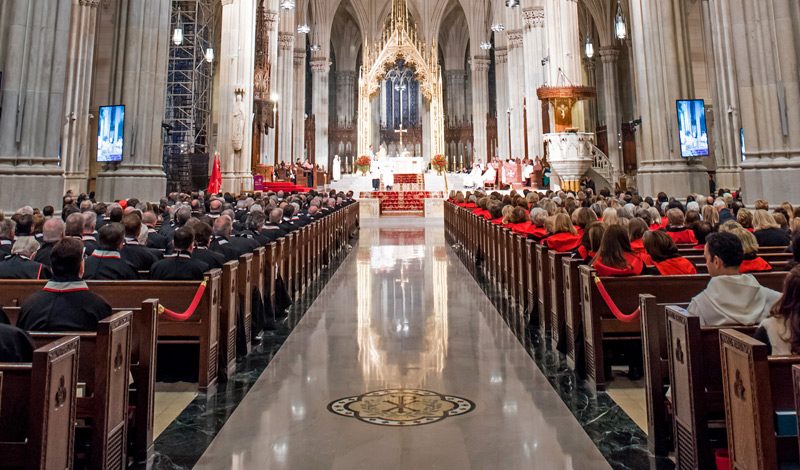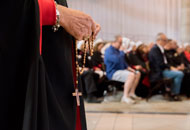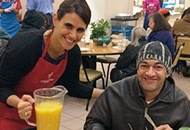Father Joseph Johnson, ChM, provides us with some insights on fasting from the Eucharist, sharing words from Cardinal Joseph Ratzinger (before he became Pope).
We often speak of fasting as preparation for Holy Communion. It is supposed to be a way of recognizing through our bodies the hunger of our souls for God’s Love. With only an hour fast as the current law and only two days of fasting in the whole year, our society doesn’t understand fasting or get any benefits from this very watered down version.
Our first meal each morning is called “breakfast” because it was the meal eaten after our ancestors had received Holy Communion. They could thus break the fast of preparation they had observed from the evening before waiting for the Holy Eucharist. Their grumbling stomachs reminded them of the spiritual hunger we all have deep in our hearts for Jesus’ Merciful Love. We are too easily satisfied and indulgent with our physical desires. We thus lose our spiritual edge.
We never speak of fasting from Holy Communion. Long before he became Pope Benedict XVI, Joseph Cardinal Ratzinger wrote the following passage about fasting from the Holy Eucharist. Years ago when I first read it, it struck me as odd and frankly I didn’t like it. I couldn’t imagine staying away from the Bread of Life.
Now in this strange and painful situation in which we find ourselves today, let us meditate on Cardinal Ratzinger’s thoughts on abstaining from the Holy Eucharist. He makes reference both to the public penance of the early Church when penitents would spend months or years in penance before being readmitted to Holy Communion and to the manner in which the great Saint Augustine of Hippo prepared for his death:
“When Augustine felt his death approaching, he ‘excommunicated’ himself and took upon himself ecclesiastical penitence. In his last days, he set himself alongside, in solidarity, with the public sinners who seek forgiveness and grace through the pain of not receiving the Communion. He wanted to meet his Lord in the humility of those who hunger and thirst for righteousness, for Him, the righteous and gracious One. Against the background of his sermons and writings, which describe the mystery of the Church as a communion with the Body of Christ and as the Body of Christ, on the basis of the Eucharist, in a really marvelous way, this gesture is quite shocking. It seems to me more profound and fitting, the more often I ponder it. Do we not often take things too lightly today when we receive the most Holy Sacrament? Could such a spiritual fasting not sometimes be useful, or even necessary, to renew and establish more deeply our relation to the Body of Christ?
In the early Church there was a most expressive exercise of this kind: probably since the time of the apostles, Eucharistic fasting on Good Friday was part of the Church’s spirituality of Communion. Not receiving Communion on one of the most holy days of the Church’s year, which was celebrated with no Mass and without any Communion of the faithful, was a particularly profound way of sharing in the Passion of the Lord: the sorrowing of the bride from whom the bridegroom has been taken away (see Mark 2:20). I think that a Eucharistic fast of this kind, if it were deliberate and experienced as a deprivation, could even today be properly significant, on certain occasions that would have to be carefully considered—such as days of penitence (and why not, for instance, on Good Friday once more?), or also perhaps especially at great public Masses when there are so many people that a dignified distribution of the Sacrament is often not possible, so that by not receiving the Sacrament people could truly show more reverence and love than by doing so in a way that contradicts the sublime nature of this event.
Such fasting—which could not be allowed to become arbitrary, of course, but would have to be consonant with the spiritual guidance of the Church—could help people toward a deepening of their personal relation to the Lord in the Sacrament; it could be an act of solidarity with all those who have a yearning for the Sacrament but cannot receive it. It seems to me that the problem of people who have been divorced and remarried, yet equally the problem of intercommunion (in mixed marriages, for example), would be less of a burden if voluntary spiritual fasting was at the same time undertaken in visible recognition and expression of the fact that we are all dependent upon that ‘healing of love’ which the Lord effected in the ultimate solitude of the Cross. I would not of course wish to suggest by this a return to some kind of Jansenism: in biological life, as in spiritual life, fasting presumes that eating is the normal thing to do. Yet from time to time we need a cure for falling into mere habit and its dullness. Sometimes we need to be hungry—need bodily and spiritual hunger—so as once more to comprehend the Lord’s gifts and to understand the suffering of our brethren who are hungry. Spiritual hunger, like bodily hunger, can be a vehicle of love.”
(Passage taken from Ratzinger’s Pilgrim Fellowship of Faith)
Click here to visit Fr. Johnson’s new website.




